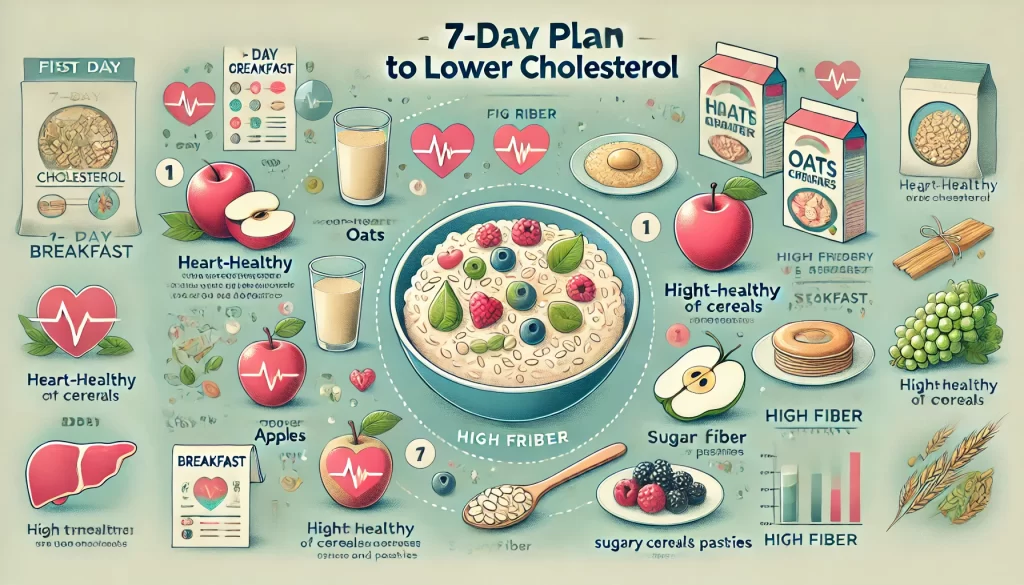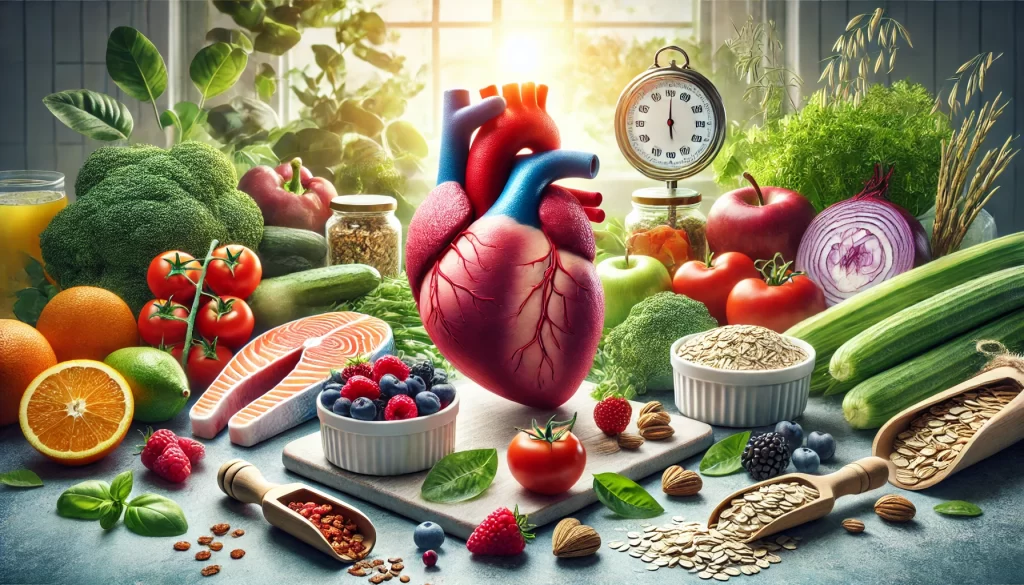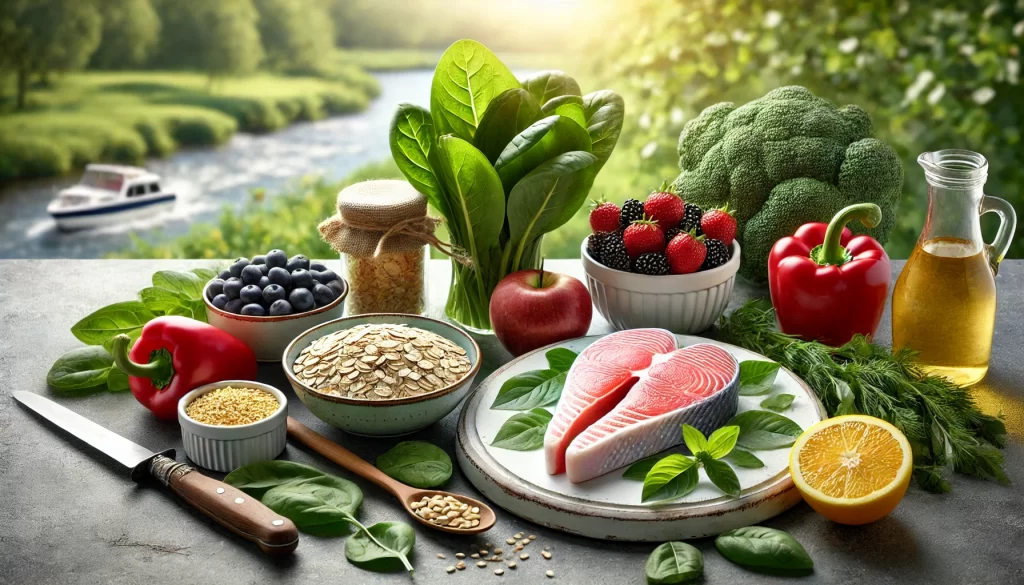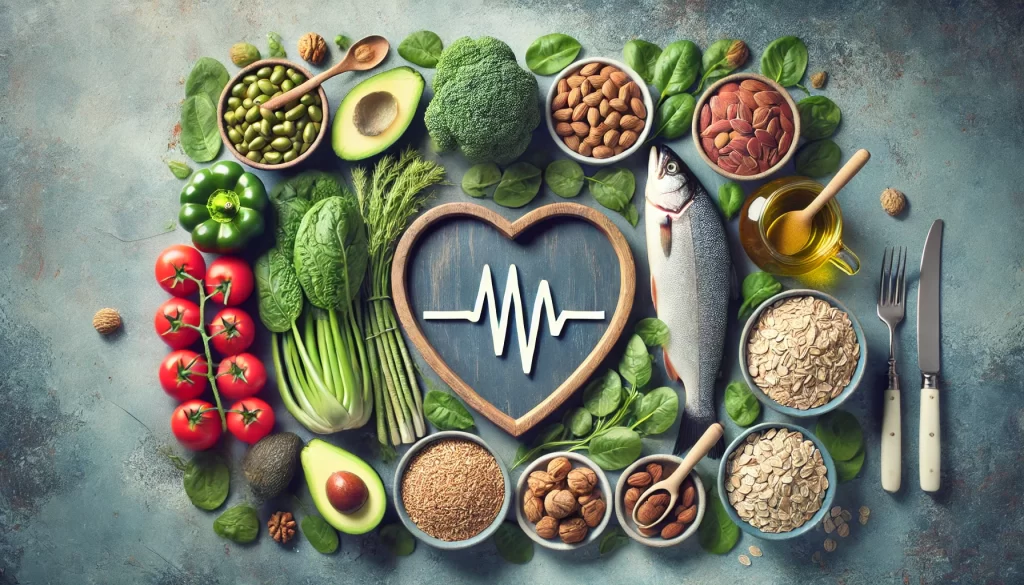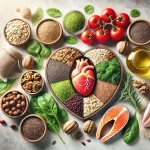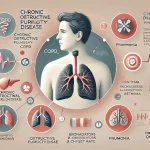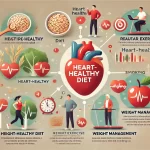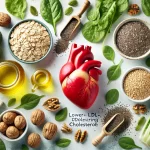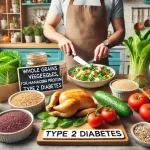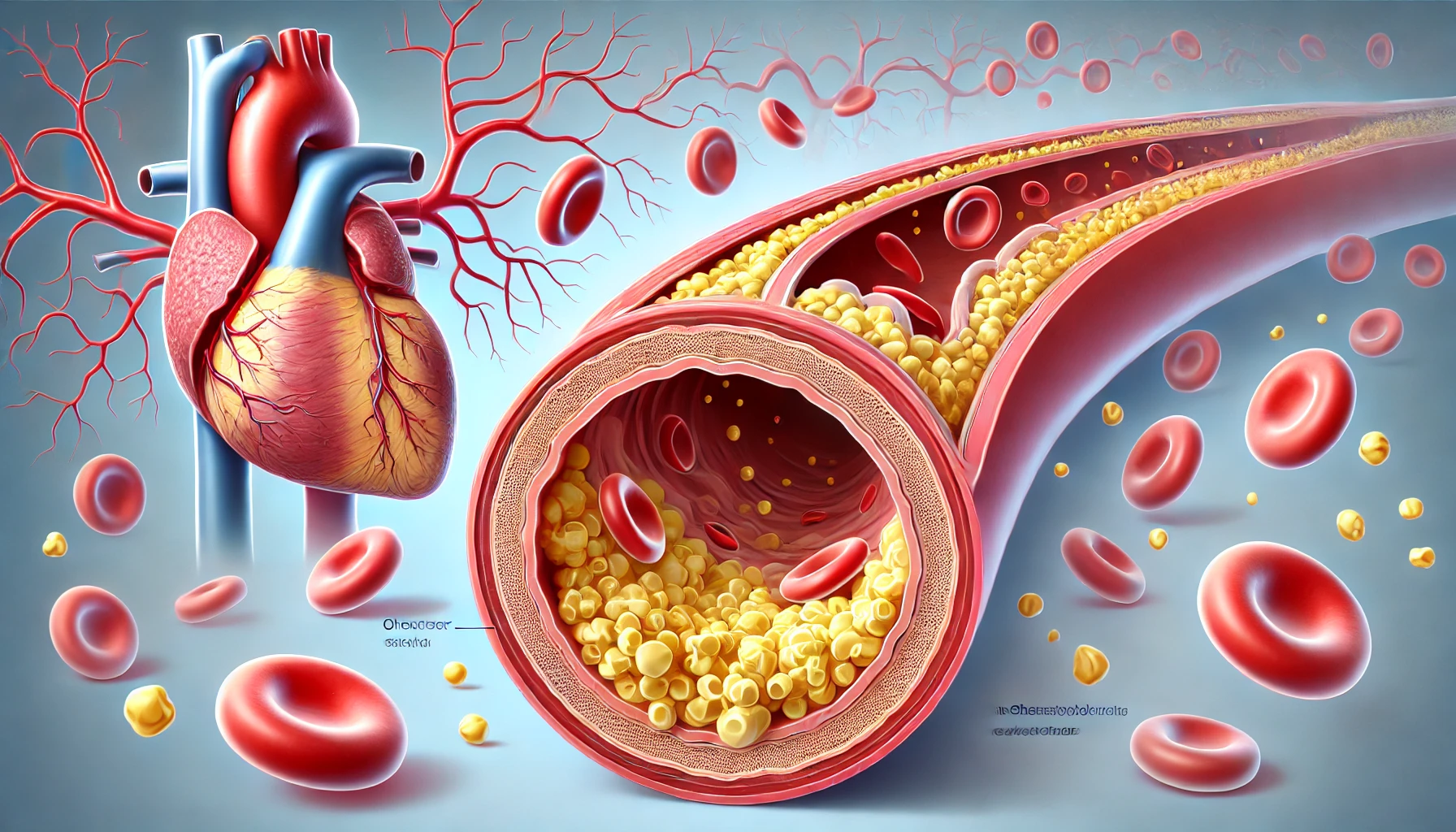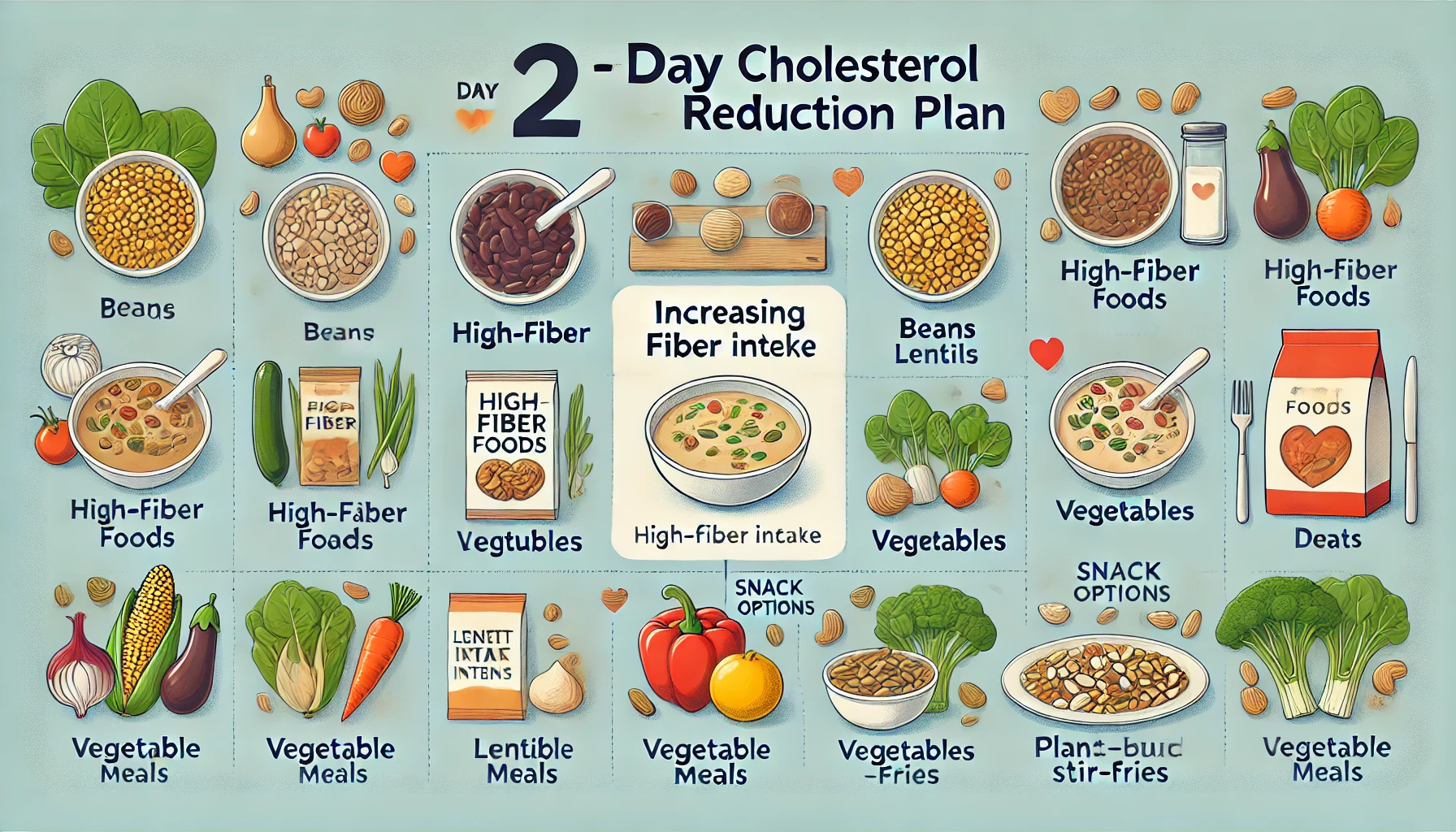
Important Points:
- Overview of cholesterol and why reducing it quickly can improve heart health
- Diet and lifestyle changes to implement for immediate impact
- Foods to include and avoid for faster results
- Exercise and relaxation tips to support cholesterol reduction
Understanding Cholesterol and Why It’s Important to Lower It
What is Cholesterol?
Cholesterol is a waxy substance found in the blood that helps build cells, produce hormones, and aid digestion. However, high cholesterol levels, particularly LDL (Low-Density Lipoprotein or “bad” cholesterol), can lead to plaque buildup in the arteries, increasing the risk of heart disease and stroke. Lowering cholesterol can significantly improve heart health, and with the right approach, you can begin to see changes in as little as one week.
Day-by-Day Plan to Reduce Cholesterol in 7 Days
Day 1: Start with a Heart-Healthy Breakfast
- Eat Oats for Breakfast: Oats are high in soluble fiber, which helps reduce LDL cholesterol. Aim for a serving of oatmeal or oat-based foods in the morning to kick-start your day.
- Add Fruits High in Fiber: Berries, apples, and bananas are great additions to oatmeal, providing extra fiber to support cholesterol reduction.
- Avoid Sugary Cereals and Pastries: These can be high in unhealthy fats and sugars, which contribute to higher cholesterol levels.
Day 2: Increase Fiber Intake Throughout the Day
- Eat More Fiber-Rich Foods: Soluble fiber can reduce cholesterol absorption in the bloodstream. Add foods like beans, lentils, and vegetables to your meals.
- Try Plant-Based Meals: Swap out meat-based meals for plant-based options like lentil soups, bean salads, or vegetable stir-fries, as these are naturally low in saturated fat.
- Snack on Nuts and Seeds: Walnuts, almonds, and chia seeds are high in heart-healthy fats and fiber. They make excellent snacks that support cholesterol reduction.
Day 3: Avoid Saturated and Trans Fats
- Limit Red Meat and Full-Fat Dairy: Saturated fats found in red meat, butter, and cheese can raise LDL cholesterol. Opt for lean meats like chicken or fish, or consider plant-based protein sources.
- Check Food Labels: Look out for trans fats, often listed as “partially hydrogenated oils,” which are commonly found in processed and fried foods.
- Use Olive Oil: Replace butter and margarine with olive oil, which contains monounsaturated fats that help raise HDL (“good”) cholesterol and lower LDL.
Day 4: Focus on Heart-Healthy Fats
- Eat Fatty Fish for Omega-3s: Salmon, trout, sardines, and mackerel are high in omega-3 fatty acids, which help reduce triglycerides and improve overall cholesterol levels.
- Try Avocado: Avocado is rich in monounsaturated fats that can lower LDL cholesterol. Add it to salads, toast, or sandwiches for a nutritious boost.
- Use Flaxseed or Chia Seed: These seeds are also high in omega-3s and fiber, making them a great addition to smoothies or yogurt.
Day 5: Add Physical Activity
- Go for a Brisk Walk: Exercise can raise HDL cholesterol, which helps remove excess LDL from the arteries. Start with a brisk 30-minute walk each day to improve heart health.
- Incorporate Aerobic Exercise: Activities like jogging, cycling, or swimming are excellent for boosting cardiovascular health. Aim for at least 30 minutes of aerobic exercise to maximize benefits.
- Add Strength Training: Building muscle can improve metabolism and aid cholesterol management. Try bodyweight exercises like squats, push-ups, or resistance band exercises.
Day 6: Manage Stress and Get Quality Sleep
- Practice Deep Breathing and Meditation: High stress levels can increase cholesterol indirectly by affecting hormone levels and inflammation. Practicing deep breathing exercises or meditation can help lower stress and support heart health.
- Ensure 7–8 Hours of Quality Sleep: Poor sleep quality can disrupt metabolism and increase LDL cholesterol. Aim for a restful night’s sleep to give your body time to repair and maintain healthy cholesterol levels.
- Limit Caffeine and Alcohol: Both can affect sleep quality and stress levels. Try to limit consumption, especially in the evening.
Day 7: Hydrate and Avoid Sugary Foods
- Drink Water Regularly: Staying hydrated helps flush out toxins and supports digestion, both of which can impact cholesterol levels. Aim for 8–10 glasses of water per day.
- Avoid Sugary Snacks and Drinks: Sugary foods and beverages can raise triglycerides and lower HDL cholesterol. Opt for natural sugars from fruits instead of processed sweets.
- Include Herbal Teas: Teas like green tea or hibiscus contain antioxidants that may help improve cholesterol levels. Sip on these teas throughout the day for added benefits.
Foods to Include for Fast Cholesterol Reduction
- Oats and Barley: Both are rich in beta-glucan, a soluble fiber that helps remove cholesterol from the bloodstream.
- Legumes: Beans, lentils, and chickpeas are high in fiber and protein, making them excellent meat substitutes to reduce saturated fat intake.
- Vegetables: Leafy greens, carrots, and broccoli are high in fiber and antioxidants, supporting cholesterol reduction and heart health.
- Nuts and Seeds: Almonds, walnuts, chia seeds, and flaxseeds provide heart-healthy fats and fiber, which can help lower cholesterol.
- Fatty Fish: Salmon, sardines, and mackerel are rich in omega-3s, reducing triglycerides and supporting cholesterol balance.
Foods to Avoid to Lower Cholesterol Quickly
- Fried Foods: Fried foods are often high in trans fats, which can increase LDL cholesterol. Opt for baked or grilled alternatives.
- Processed Meats: Sausages, bacon, and deli meats are high in saturated fat and sodium, both of which can raise cholesterol levels.
- Full-Fat Dairy: Whole milk, cheese, and butter contain high levels of saturated fat. Choose low-fat or plant-based dairy options instead.
- Sugary Foods and Beverages: Sweets, sodas, and pastries contribute to high triglycerides, which impact cholesterol levels negatively.
- Refined Grains: White bread, pasta, and rice can raise blood sugar levels and indirectly impact cholesterol. Opt for whole-grain options whenever possible.
Conclusion: Quick and Effective Steps to Lower Cholesterol in 7 Days
Lowering cholesterol in 7 days is achievable with the right dietary changes, exercise, and lifestyle adjustments. By focusing on heart-healthy foods, increasing physical activity, managing stress, and avoiding unhealthy fats, you can significantly improve your cholesterol levels and support heart health. Remember that maintaining these habits beyond one week is essential for long-term health and to keep cholesterol levels in check. Taking action today can reduce your risk of heart disease, improve energy levels, and enhance overall well-being.

